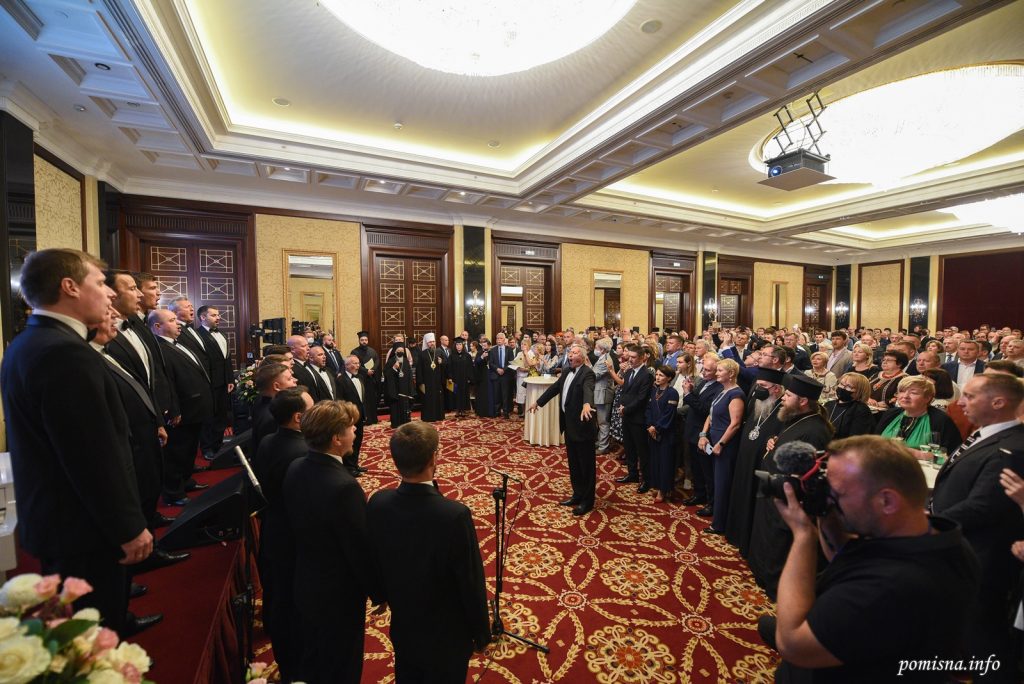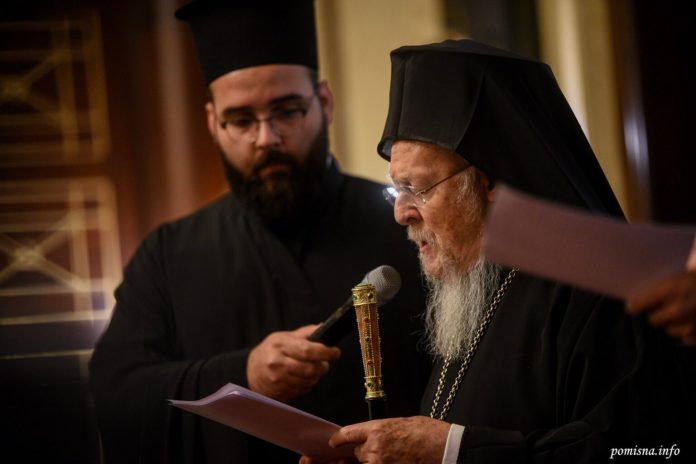Ακολουθεί η ομιλία του Παναγιωτάτου Οικουμενικού Πατριάρχου κατά την ανακήρυξή του σε Επίτιμο Διδάκτορα του Εθνικού Πανεπιστήμιου Kyiv-Mohyla Academy (Κίεβο, 22 Αυγ. 2021):
Your Eminences and Excellencies,
Distinguished Faculty and Students of the National University of Kyiv-Mohyla Academy,
Ladies and Gentlemen,
It is with much gratitude and joy that we accept the National University of Kyiv-Mohyla Academy’s bestowal of a Doctorate Honoris Causa upon our humble person. We consider this gesture a tribute paid to the Ecumenical Patriarchate, the Great Church of Christ, in recognition of its many initiatives, especially on matters related to dialogue, unity, creation care, solidarity and peace.
Allow us to quote here what the Encyclical of the Holy and Great Council of the Orthodox Church, convened in Crete in June 2016, says about peace: “The Church strives to make ‘the peace from on high’ more tangibly felt on earth. True peace is not achieved by force of arms, but only through love that ‘does not seek its own’ (1 Cor 13:5). The oil of faith must be used to soothe and heal the wounds of others, not to rekindle new fires of hatred.” (§17)
For us, peace and dialogue pave the way to unity. This is why our Mother Church of Constantinople has always expressed profound care regarding the ecclesial situation of the Ukrainian people. The granting of autocephaly to the Orthodox Church of Ukraine in 2019 was before all a pastoral concern for spiritual justice and freedom. In order to remain accountable to the words excerpted above that “The oil of faith must be used to soothe and heal the wounds of others,” the granting of autocephaly was of crucial importance to heal the schisms and divisions in the local Church and to strive for visible unity. The division of the body of the Orthodox Church into three separate entities in Ukraine was a deep wound for the communion of the entire Orthodox Church. Recalling the words of St. Paul, “if one member suffers, all suffer together.” (I Corinthians 12:26). There is no freedom in division because true freedom is realized in a lived experience of unity, which includes and protects otherness, not as an element of separation but rather as a means of creative coexistence and collaboration.
In this sense, we are convinced that the granting of autocephaly would ultimately help with the question of unity. Until recently, most of the Ukrainian people were alienated from the rest of the Orthodox world, and even though they searched for autocephaly their effort was not against the deep essence of unity but a proper way towards the unity of the Church.
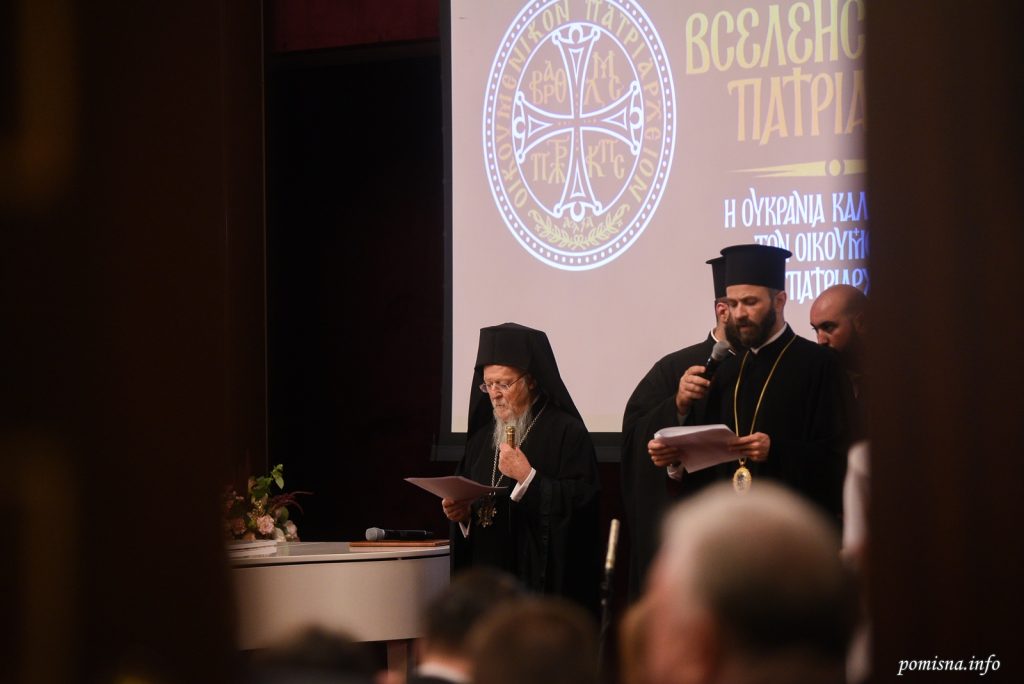
In order to address the schism and promote unity among the Orthodox in Ukraine, the Ecumenical Patriarchate, as the Mother Church of the Ukrainian People, with much deliberation and contemplation, took the necessary and canonical steps to respond to the numerous petitions of Presidents, civil authorities, the Verkhovna Rada, and Ukrainian citizens presented before the commencement of the Holy and Great Council in 2016, bestowing the desired status of autocephaly. Let us not forget that similar requests for “complete canonical independence” for the Orthodox of Ukraine had previously been addressed, uncanonically, to the late Patriarch of Moscow, Alexis II, in November of 1991 by Ukrainian bishops and were neglected. Patriarch Alexis ought to have informed the Ecumenical Patriarchate about this demand, the only See responsible in the Orthodox world to canonically grant the autocephalous status.
The Ecumenical Patriarchate has always hastened to assist and support Orthodox Churches in the face of trial. The unity of Orthodoxy is not being tested because of the Ecumenical Patriarchate’s response to the request of the Ukrainian Orthodox. Ukrainian Autocephaly was an act of responsibility on the part of the Mother Church. No one can soundly assert that in carrying one lost sheep to safety within the Church, we engage in serving political agendas and geopolitical interests of the world. Presently, after several years, we are glad to see the new Church grow and His Beatitude Metropolitan Epifaniy of Kyiv contribute to the normalization of the ecclesiastical life under his wise spiritual leadership.
The granting of autocephaly to the Church of Ukraine by the Ecumenical Patriarchate was not merely ecclesiologically and canonically correct but also the sole realistic solution to the problem. Consequently, only the recognition of the Ukrainian Autocephaly by all the Orthodox Churches, and not any other stance, be it waiting or calls for pan-Orthodox meetings or endless and countless interviews in the media, replete with offensive characterizations, will contribute to pan-Orthodox unity. In that manner, whoever threatens to break Eucharistic Communion with the Ecumenical Patriarchate is engaging in a self-depriving act that cuts himself off from the trunk of the tree of the Orthodox Church. As we have previously stated, the Church cannot allow Orthodox Ecclesiology to be distorted in the name of base motives.
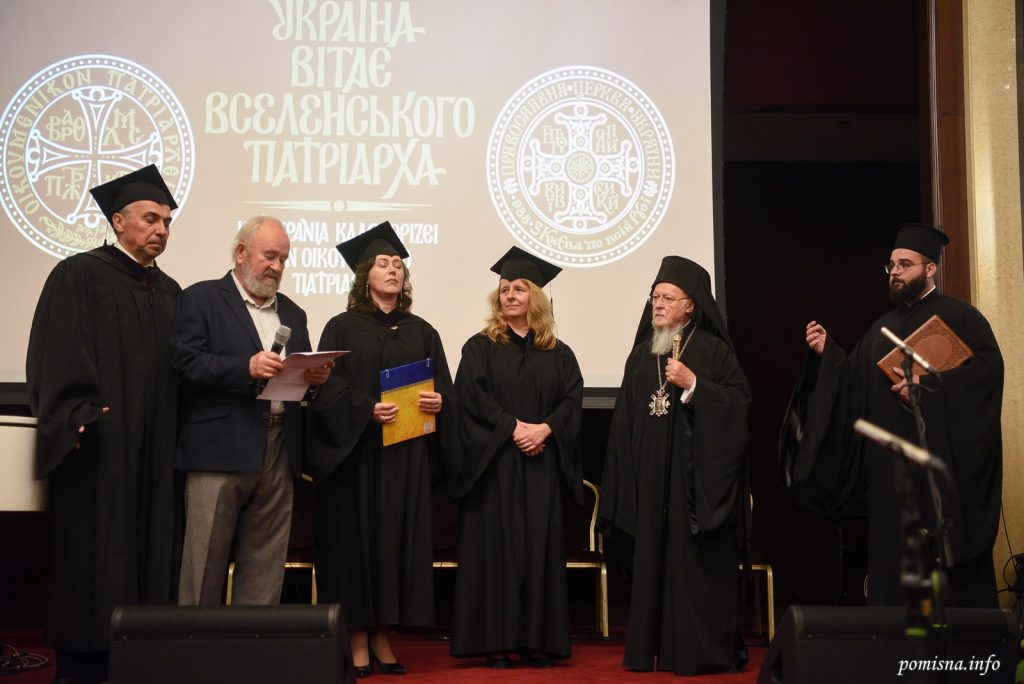
Another example of how the Ecumenical Patriarchate attempts to heal division is its continued efforts to restore humanity’s relationship with the natural environment. The preoccupation of the Ecumenical Patriarchate with the ecological crisis is grounded on the principle that we cannot have two ways of looking at the world: religious on the one hand and worldly on the other. We cannot separate our concerns for human dignity, human rights or social justice from concerns for ecological preservation and sustainability. These concerns are inextricably linked; If we value each individual as being made in the image of God and if we value every particle of God’s creation, then we, by necessity, are called to love each other and care for our world. What else can be more an act of love for our neighbor than to care for the environment that gives us the space to achieve communion within? With this question in mind, we must remember that the manner and attitude of how we relate to nature directly reflects the way we relate to God and our fellow human beings.
It is well known that our venerable predecessor, Ecumenical Patriarch Demetrios of blessed memory, sent, on September 1st, 1989, the very first Encyclical to all the Orthodox Churches throughout the world, instituting the first day of the ecclesiastical year as the Day of Prayer for the Protection of Creation. This initiative was quickly followed by the Conference of European Churches, the World Council of Churches, and more recently, in the Roman Catholic Church by our brother, Pope Francis.
Further elaborating the Orthodox Church’s “green ethos,” the Encyclical of the Holy and Great Council refers clearly to the spiritual and ethical roots of the ecological crisis, stating: “The roots of the ecological crisis are spiritual and ethical, inhering within the heart of each man. This crisis has become more acute in recent centuries on account of the various divisions provoked by human passions – such as greed, avarice, egotism and the insatiable desire for more – and by their consequences for the planet, as with climate change, which now threatens to a large extent the natural environment, our common “home.” The rupture in the relationship between man and creation is a perversion of the authentic use of God’s creation.” (§14)
Moving from contemporary actions to examining the foremost symbol and declaration of the Orthodox faith, namely the Nicene-Constantinopolitan Creed, the Orthodox Church identifies our relation to nature by confessing and glorifying the “one God, maker of heaven and earth, and of all things visible and invisible.” Therefore, an Orthodox Christian perspective on the natural environment originates in the basic principle that this world was created by God. The Holy Scripture states that “God saw everything that was created and, indeed, it was very good.” (Gen. 1:31)
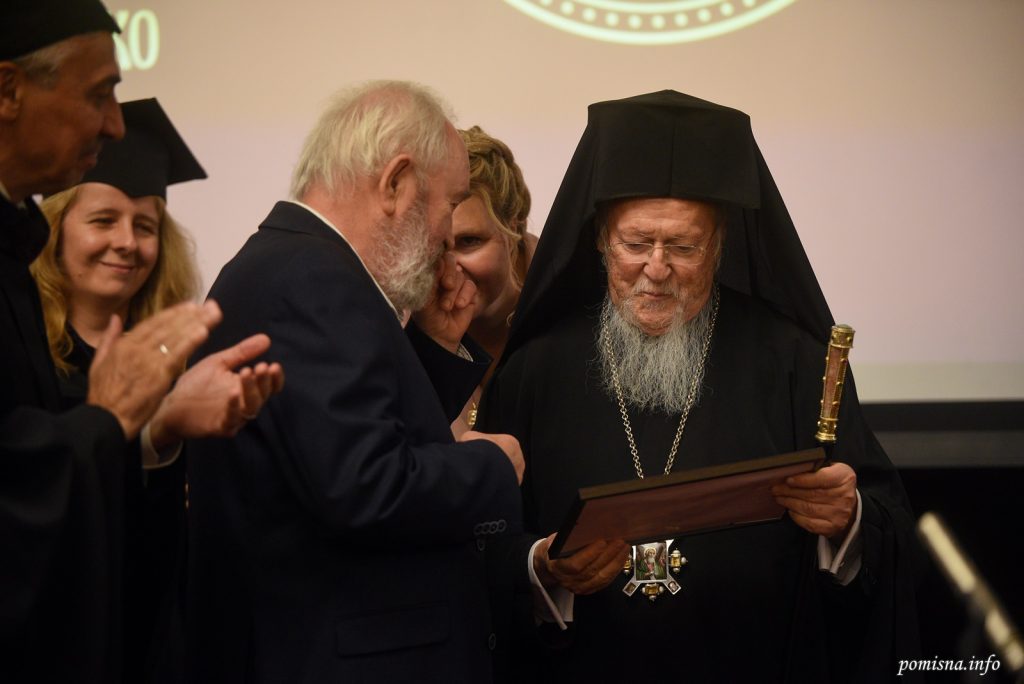
From this fundamental belief in the sacredness and beauty of all creation and the Incarnation of the Word of God for the salvation of humanity and the world, the Orthodox Church articulates its crucial concept of cosmic transfiguration. Moreover, the emphasis of Orthodox theology on personal and cosmic metamorphosis is especially apparent in its liturgical feasts. Thus, the Feast of Christ’s Transfiguration, celebrated on August 6th, highlights the sacredness of all creation, which receives and offers a foretaste of the final resurrection and restoration of all things in the age to come. Just as the Lord’s Body was glorified on Mt. Tabor, so we humans and the whole creation will be redeemed and renewed in the Kingdom of God.
We have repeatedly stated that the crisis we are facing today concerns the way we perceive and conceive our world. We are treating our planet in a sacrilegious manner precisely because we fail to see it as a gift inherited from above, and further, we fail to recognize our obligation to receive, respect and pass this gift to future generations. Therefore, before we can effectively deal with the problems of our environment, we must change the way we see the world. Otherwise, we are simply dealing with symptoms and not their causes. We require a new worldview, a spiritual one, if we are to desire for what the Book of Revelation calls: “a new earth.” (Rev. 21:1)
We don’t cease to mention that the Orthodox Church’s interest in the protection of creation was not just a reaction to the contemporary global ecological crisis. It was simply an opportunity for the Church to express and promote its environmentally friendly principles, as well as its respect towards “very good” creation (Gen. 1:31) and its doxology and praise of the Creator of all. Our present ecological problems are the occasion and not the cause of the ecological stance of our Church, which has been correctly called the “ecological form of Christianity.”
Having referred to the centrality of Orthodox unity and the protection of the environment, we need to finally elaborate on the religion and peace nexus. Unfortunately, the ongoing outburst of religious fundamentalism and terrible acts of violence in the name of religion have given fuel to the fire of modern critiques of religious faith and supports the identification of religion with its temporal and imperfect attributes. The truth is that violence is the antithesis of fundamental religious beliefs and doctrine. True faith does not release humans from being responsible for the world, respecting human dignity and struggling for justice and peace. On the contrary, it strengthens the commitment of human action while enlarging our decisiveness to uphold freedom and core values.
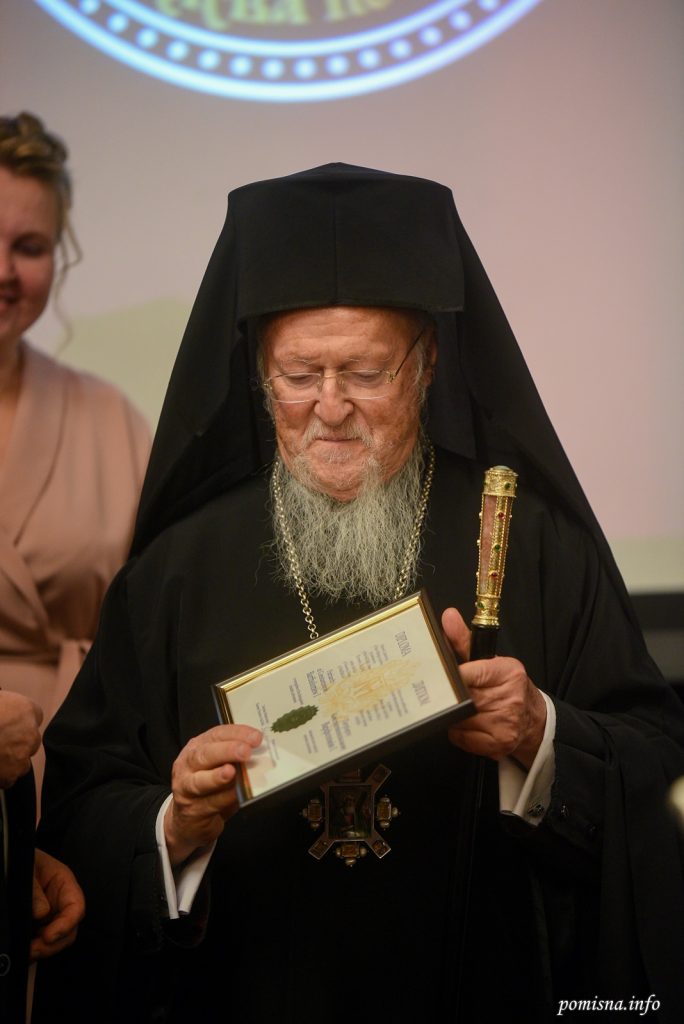
For several centuries, the Mediterranean has experienced a relatively peaceful cohabitation of Jews, Christians and Muslims. This historic reality demonstrates that people from different religions can peacefully coexist, finding faith the most fundamental aspiration for humanity that unites us instead of being a source of division and hatred. It shows that religions can serve as bridges between people, a bridge built by the instruments of faith and discernment, which shape the raw materials of experience and memory into a structure that exists for the purpose of dialogue, peace, and unity. This idea was clearly mentioned in a document published in 2020 with the blessing of the Ecumenical Patriarchate’s Holy and Sacred Synod, entitled For the Life of the World. Toward a Social Ethos of the Orthodox Church, where one can read that “The Orthodox Church approaches inter-religious dialogue in full recognition of the real differences between traditions, but firmly insists nonetheless on the real possibility of peaceful coexistence and cooperation among different faiths. Above all, it seeks to overcome ignorance, hostility, and fear with reciprocal comprehension and the peace of true friendship.” (§59)
Interreligious dialogue does not mean to deny one’s own faith but rather to change one’s mind or attitude towards the other. Openness to the other does not threaten our particular identity. On the contrary, it deepens and enriches it. In this regard, interfaith dialogue can help heal and disperse prejudices, contributing to a mutual comprehension of communities and the pacific resolution of conflicts. Biases and the discrimination of others come from the misrepresentation of religion connected with ignorance, isolation and introversion. This is why only through intentioned and open dialogue, all fear and suspicion of our fellow brothers and sisters can be chased away. Dialogue is central for peace in the world, but only in a spirit of mutual confidence and respect. As has been properly stated, “There is no automatism on the way to peace. Peace is more a duty than a given reality. It requires struggles and sacrifices, insistence and patience, dialogue and solidarity. There is no doubt that religions can deeply contribute to world peace. Authentic faith widens the mind, releases the power of love and breaks the bonds of sterile egocentricity. This is why it is not wrong to expect more from religion, but it is a major mistake to expect less than religion can and must provide to us.”
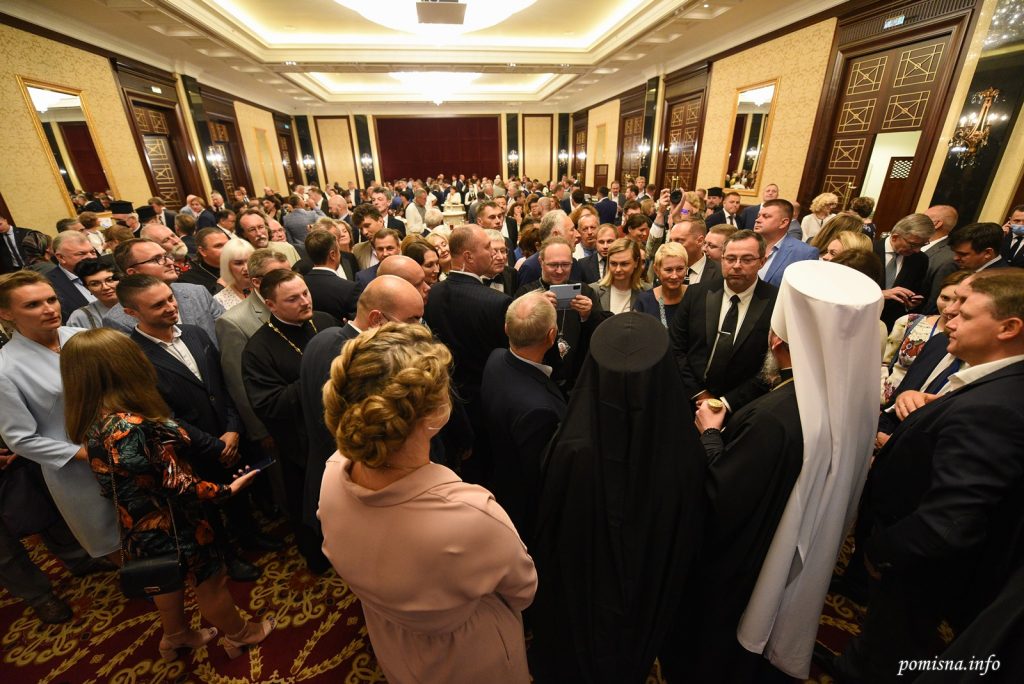
Ladies and Gentlemen,
It is an honor and a privilege to speak before you as we humbly receive this Doctorate Honoris Causa today. Before we conclude our remarks, we would like to add some last thoughts. In order to preserve the credibility of religious voices in our world today, we have to insist on our professed commitment to peace and unity, to the protection of the environment and to our vital contribution, as faith communities, to dialogue and reconciliation. These are the necessary conditions not only for peaceful coexistence in the world but also for the sheer survival of humanity. It is impossible to confront the great challenges of our times only on the basis of science and technology, bureaucracy and economic-oriented decisions. These powers can provide only temporary solutions. There is no real progress if core values, such as freedom, justice and solidarity, are not respected.
Humanity’s precious experience is that we can face the global challenges of our times only together. Nobody — no nation, no state, no religion, no culture and scientific progress — can solve the current problems alone. We need one another; we need joint mobilization, common efforts, common goals, a common spirit. The current pandemic has starkly reminded us of the nature of our limits and capacity, and above all, of our interdependence. Therefore, we regard present complex crises as opportunities for practicing solidarity, for dialogue and cooperation, for openness and confidence. There are various paths to our future, but there must be a common one, taken up by the whole world in solidarity. As it is written in the Psalms: “Behold now, what is so good or so pleasant as for brothers [and sisters] to dwell together in unity?” (Psalm 133:1). Unity is a blessing from God and the ultimate destination for us, who are “God’s offspring” (Acts 17:29).
Thank you for your attention!
